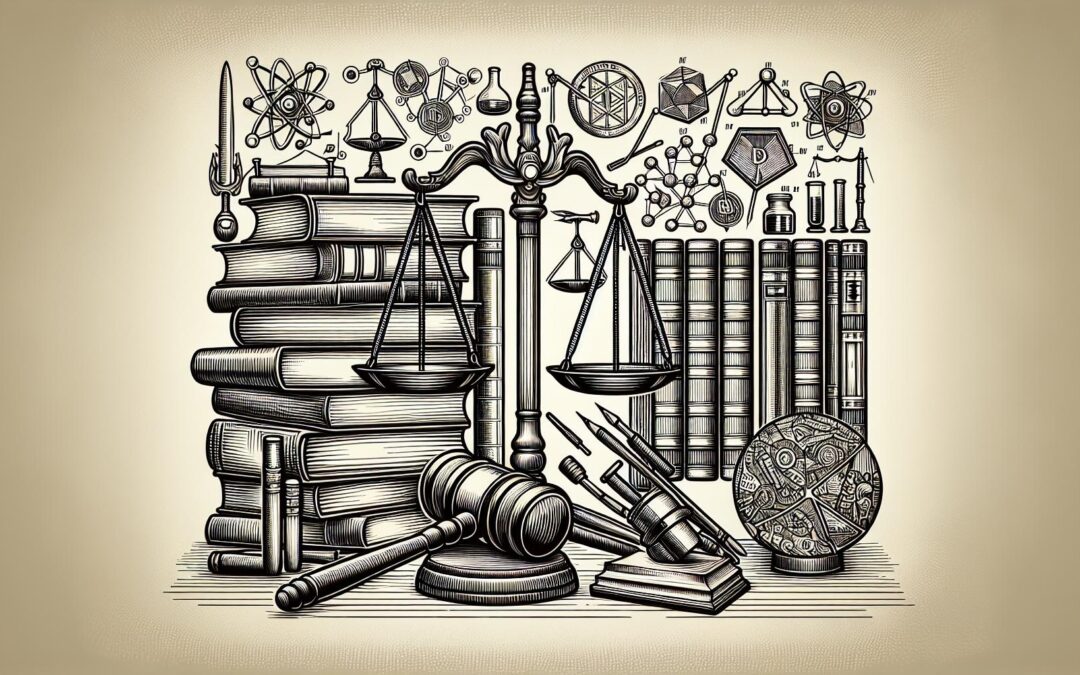In today’s digital age, the Freedom of Information Act (FOIA) plays a crucial role in ensuring transparency and accountability in government agencies. This article aims to provide a comprehensive understanding of FOIA and its intersection with intellectual property. By exploring its history, purpose, and workings, we can delve into the various ways FOIA requests can uncover valuable intellectual property information. Additionally, we will discuss the future of FOIA and potential changes in legislation that may shape its impact on intellectual property rights.
Understanding the Freedom of Information Act (FOIA)
Before delving into the specifics, it is important to understand the foundation of FOIA. The FOIA, enacted in 1966, provides individuals with the legal right to access information held by federal government agencies. This act empowers citizens to uncover government activities, ensuring transparency and accountability.
The Freedom of Information Act (FOIA) is a crucial piece of legislation that has had a significant impact on the relationship between the government and its citizens. It has played a vital role in promoting transparency, accountability, and informed participation in the democratic process. By granting public access to government records, FOIA has become an essential tool for citizens, journalists, researchers, and businesses to obtain information that may have a profound impact on various intellectual property-related matters.
The History of FOIA
The journey of FOIA began in response to growing concerns about government secrecy following World War II. The need for public access to information gained momentum, leading to the establishment of FOIA as a means to facilitate transparency.
During the post-war era, there was a widespread belief that excessive government secrecy had hindered the public’s ability to hold their elected officials accountable. This sentiment was fueled by incidents such as the Watergate scandal, which highlighted the importance of government transparency and the need for mechanisms to ensure it.
In 1966, President Lyndon B. Johnson signed the Freedom of Information Act into law, marking a significant milestone in American history. This groundbreaking legislation aimed to provide individuals with the right to access information held by federal government agencies, ultimately empowering citizens to scrutinize government actions and decisions.
The Purpose and Importance of FOIA
The primary purpose of FOIA is to grant public access to government records. By doing so, FOIA promotes transparency, accountability, and informed participation in the democratic process. It allows citizens, journalists, researchers, and businesses to obtain essential information that may have a significant impact on intellectual property-related matters.
Transparency is the cornerstone of a functioning democracy. It enables citizens to make informed decisions, hold public officials accountable, and contribute to the policymaking process. FOIA plays a vital role in achieving these objectives by ensuring that government actions and decisions are open to public scrutiny.
Moreover, FOIA serves as a check on government power. It allows individuals and organizations to uncover potential misconduct, corruption, or inefficiencies within government agencies. By shining a light on these issues, FOIA empowers citizens to demand change and hold their elected officials accountable.
How FOIA Works
FOIA establishes a process through which individuals or organizations can request specific records from federal government agencies. Upon receiving a FOIA request, the agency must conduct a diligent search for the requested records. However, there are specific exemptions and exclusions that allow agencies to withhold certain information, such as classified materials or trade secrets.
To make a FOIA request, an individual typically submits a written application to the relevant government agency. The application should include specific details to help identify the desired information. The agency then has a specified timeframe to respond to the request, either by providing the requested records or explaining any applicable exemptions.
It is worth noting that the process of obtaining information through FOIA can sometimes be complex and time-consuming. Government agencies have a responsibility to balance the public’s right to access information with the need to protect sensitive or classified materials. This delicate balance ensures that national security interests are upheld while still promoting transparency and accountability.
Overall, FOIA has proven to be a powerful tool in the hands of the public. It has enabled countless individuals to uncover critical information, shed light on government actions, and contribute to public discourse. The continued use and support of FOIA are essential in maintaining a healthy democracy and ensuring that the government remains accountable to its citizens.
The Intersection of FOIA and Intellectual Property
While FOIA primarily focuses on government transparency, it also intersects with intellectual property matters. The protection of intellectual property rights is crucial for fostering innovation, creativity, and economic growth. In this section, we will explore the role of FOIA in safeguarding intellectual property and explore case studies showcasing the importance of FOIA requests in this domain.
Intellectual property, which includes patents, trademarks, copyrights, and other creative works, plays a vital role in driving economic development and technological advancements. FOIA requests can unveil valuable information related to intellectual property. By accessing government records, individuals can gather insights into patents, trademarks, copyrights, and other intellectual property assets. This information can aid inventors, entrepreneurs, and researchers in conducting prior art searches, ensuring that their inventions or creative works are not already patented or protected.
Furthermore, FOIA requests can reveal how government agencies handle intellectual property-related matters, allowing for better understanding and potential improvements to intellectual property policies and procedures. This transparency promotes accountability and ensures that the government is effectively protecting intellectual property rights.
Case Studies: FOIA Requests Related to Intellectual Property
Several noteworthy case studies highlight the significance of FOIA requests in uncovering intellectual property information. One such example involves the disclosure of patent applications filed by government agencies. These applications often reveal ongoing research, innovative technologies, and potential commercial opportunities in various industries.
For instance, a FOIA request made by a group of researchers seeking information on government-funded research projects led to the discovery of a patent application for a groundbreaking medical device. This device had the potential to revolutionize the treatment of a certain medical condition, and the disclosure of the patent application allowed other researchers and companies to collaborate and build upon this innovation.
Another case study involves the disclosure of copyright registrations and licensing agreements. Access to this information enables artists, authors, and content creators to better understand market dynamics, negotiate fair compensation, and protect their own creative works. A FOIA request made by a group of independent filmmakers, for example, led to the disclosure of licensing agreements between a government agency and a major film studio. This information allowed the filmmakers to negotiate better terms for their own films and ensure that their intellectual property rights were respected.
Overall, FOIA requests play a crucial role in protecting and promoting intellectual property rights. By providing access to government records, FOIA empowers individuals and organizations to make informed decisions, foster innovation, and contribute to the growth of various industries. The intersection of FOIA and intellectual property is an important area that continues to shape the landscape of innovation and creativity.
Intellectual Property Terminology: A Comprehensive Guide
To fully comprehend the impact of FOIA on intellectual property, it is essential to have a solid understanding of common terminology in this field. This section will provide a comprehensive guide to key terms related to patents, trademarks, copyrights, and other aspects of intellectual property rights.
Having a strong grasp of intellectual property terminology is crucial when navigating the complex world of legal protections. By familiarizing yourself with the various concepts and legal terms, you can better understand the implications of FOIA requests on intellectual property.
Common Intellectual Property Terms
Intellectual property encompasses a wide range of concepts and legal protections. Understanding terms such as infringement, fair use, trade secrets, and licensing agreements will provide a solid foundation for navigating the complexities of intellectual property law.
When it comes to intellectual property, infringement refers to the unauthorized use, reproduction, or distribution of protected works without the owner’s permission. Fair use, on the other hand, allows for limited use of copyrighted material without permission, typically for purposes such as criticism, commentary, or education.
Trade secrets are valuable pieces of information that give a business a competitive edge. These can include formulas, processes, or methods that are kept confidential to maintain a company’s advantage in the market. Licensing agreements, on the other hand, are legal contracts that grant or restrict the use of intellectual property, allowing others to use the protected work under specific conditions.
Understanding Patents, Trademarks, and Copyrights
Patents, trademarks, and copyrights are three vital forms of intellectual property protection. Exploring each in detail will shed light on their purpose, scope, and how FOIA requests can uncover valuable information related to these rights.
Patents grant inventors exclusive rights to their inventions, ensuring no one else can make, use, or sell the patented invention without permission. This protection encourages innovation by providing inventors with the opportunity to profit from their creations while preventing others from exploiting their ideas.
Trademarks protect distinctive signs, symbols, or logos associated with products or services. They serve as a means for consumers to identify and distinguish one brand from another. Trademark infringement occurs when someone uses a mark that is confusingly similar to an existing trademark, potentially causing consumer confusion or diluting the original mark’s distinctiveness.
Copyrights safeguard original creative works, including literary, artistic, and musical expressions. This protection grants the creator exclusive rights to reproduce, distribute, perform, display, or modify their work. Copyright infringement occurs when someone uses, copies, or distributes copyrighted material without permission, potentially depriving the creator of their rightful earnings.
FOIA requests can play a crucial role in intellectual property matters. They can uncover valuable information related to patent applications, trademark registrations, and copyright registrations. By accessing these documents through FOIA, individuals and organizations can gain insights into the intellectual property landscape and make informed decisions regarding their own creations and business strategies.
How FOIA Requests Can Uncover Intellectual Property Information
Now that we understand the intersection of FOIA and intellectual property, let’s explore the process of making FOIA requests to obtain valuable information related to patents, trademarks, copyrights, and other intellectual property assets.
The Process of Making a FOIA Request
Making a FOIA request involves a systematic approach to ensure effective results. It is essential to clearly define the desired information, research which agency may hold the requested records, and submit a well-crafted FOIA request. Following these steps will increase the chances of obtaining valuable intellectual property information.
Potential Challenges in Obtaining Intellectual Property Information
While FOIA requests can be incredibly valuable in uncovering intellectual property information, certain challenges may arise. Some records may be exempt from disclosure due to national security concerns, confidential business information, or ongoing investigations. Additionally, the complexity of intellectual property systems may make it challenging to navigate the vast amount of available information.
Despite these challenges, persistence, and careful crafting of FOIA requests can increase the likelihood of obtaining essential intellectual property insights.
The Future of FOIA and Intellectual Property
Looking ahead, various factors will shape the future of FOIA and its impact on intellectual property rights. Technological advances and potential changes in legislation could influence how FOIA requests are handled, processed, and their overall effectiveness in uncovering intellectual property information.
Technological Advances and Their Impact
The rapid growth of technology introduces both opportunities and challenges for FOIA requirements and implementation. As more government records are digitized and stored electronically, the accessibility and searchability of information improve. However, ensuring data security and privacy will remain paramount, considering the sensitive nature of intellectual property assets.
Potential Changes in Legislation
Legislation surrounding FOIA and intellectual property is not immune to change. As emerging technologies and business models evolve, lawmakers may revisit and revise existing laws to address new challenges and protect intellectual property rights adequately. It is crucial to stay informed about any legislative developments that may impact FOIA and its intersection with intellectual property.
In conclusion, the Freedom of Information Act (FOIA) plays a vital role in promoting transparency and accountability. Its intersection with intellectual property allows individuals to uncover valuable information related to patents, trademarks, copyrights, and more. By understanding FOIA’s history, purpose, and workings, we can navigate the process of making FOIA requests to obtain valuable intellectual property insights. Despite the challenges that may arise, FOIA continues to be a vital tool for accessing government records and shedding light on important intellectual property matters. As technology advances and legislation potentially changes, it is essential to stay informed and adapt to the evolving landscape of FOIA and intellectual property rights.











